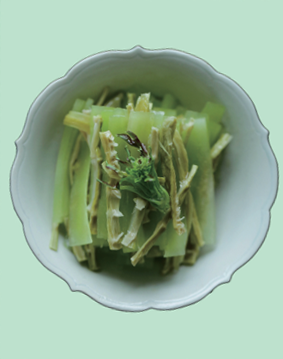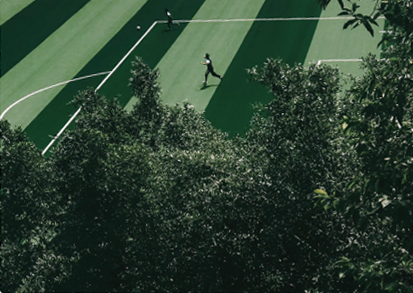
A summer dish that Dong Yi made with celtuce. DONG YI/FOR CHINA DAILYFrom joyous celebrations to deep-seated complaints, summer experiences reflect a spectrum of personal and regional influences.
No other season evokes such polarized attitudes as summer. On Chinese social media, summer enthusiasts and detractors share posts, pictures, and videos to either celebrate or lament the season.
Icy watermelons, sparkling water, fireworks, green shades, evening breezes, and colorful dresses—these images encapsulate the summer memories or fantasies of those who love the season. For Zhang Suna from Harbin, Northeast China's Heilongjiang province, these poetic depictions are a reality.
Summer is Zhang's favorite season. She even dedicated an episode of her podcast, "Yiran Ziqia"(meaning"remaining self-consistent"), to listing all the reasons she loves summer. Her cohost, Yumin(pseudonym)from Chengdu, Southwest China's Sichuan province, took the opposite stance, criticizing the inconveniences of summer in the same episode.
For Zhang, the greatest appeal of summer lies in its vitality. Lush plants, rich green hues, evening cicadas, and long daylight hours all signify life. She likens herself to a sun-loving plant.
"Whenever it gets cloudy, rainy, or snowy in winter, I get a bit emotional. But if the sun is out, no matter how hot it is, I feel happy. Summer gives me a sense of positivity and growth, "she said. "Perhaps one's preference for a season is related to their personality. "
The region where one lives also influences their perception of seasons. Zhang grew up in Harbin, where summers are relatively cool by Chinese standards.
"Harbin becomes very lively in summer, with events like concerts, beer festivals, and marathons. Locals enjoy strolling by the river or just sitting there and watching the birds, "she said.
This summer photograph by Jin Baikai captures a dark, mossy green tone, evoking a sense of oppression. JIN BAIKAI/FOR CHINA DAILY
Now living and working in Shanghai, Zhang finds the summer in southern China more stifling but also more vibrant and brighter. "Shanghai's summer has a straightforward personality. Rain comes suddenly, and the sun shines intensely, "she explained.
This intense and clear rhythm might be why summer stirs such strong feelings among different groups of people. "Autumn and spring are more ambiguous and can even feel like winter at times. But summer is distinctly hot, presenting itself as a very clear season, so whether it is love or hate, people have strong emotions about it, "Zhang added.
Dong Yi from Hangzhou, East China's Zhejiang province, believes that everything grows in accordance with the time of year, and the changing seasons are gifts from time itself.
"Spring brings sprouts, summer fosters growth, autumn yields harvests, and winter stores. Summer is a season of flourishing. I love summer, "she said.
Summer also brings with it unique seasonal ingredients. Dong, who has a passion for traditional Chinese culture, enjoys using local ingredients to prepare dishes suitable for each season.
"For example, bayberries are great for quenching thirst, watermelons keep you hydrated, lotus roots help reduce dampness, and bitter melons are effective in clearing heat, "she explained.
Before cooking, Dong usually consults the Compendium of Materia Medica(Bencao Gangmu), a 16th-century Chinese medical encyclopedia written by Li Shizhen(1518-93), to ensure the ingredients are appropriate for summer consumption.
She prefers light cooking methods like boiling, steaming, or preparing cold dishes, avoiding deep-frying or grilling.
As a graphic designer, Dong also pays great attention to the color and presentation of her food, aiming to create a"refreshing"feel. She often uses a rich green palette in her summer dishes. For example, she would pair green plums with perilla juice to craft a signature summer drink.
Delicious food is Dong's"summer cooling strategy", as she describes it.
Yumin's aversion to summer is so intense that she effortlessly outlines the"seven deadly sins"of the season on her podcast.
First on her list is the plum rain season. Every year from mid-June to early or mid-July, the middle and lower reaches of the Yangtze River in China experience continuous rainy weather. This period coincides with the ripening of plums in the region, hence the name"plum rain".
"When I was in school, the light drizzle or torrential downpours of summer were just a scenic backdrop that I could enjoy from my window. However, since I started working and commuting, the frequent summer rains have become a nightmare, "she said.
Wet socks and shoes clinging to her skin make her uncomfortable, and sometimes she even has to skip lunch because the relentless rain makes it difficult to go out.
LIU CHANG/CHINA DAILY
The humidity and high temperatures of summer can also take a psychological toll. Yumin mentioned experiencing seasonal depression, which often occurs in late spring and early summer.
"I even feel that the seasonal changes affect my hormone levels, worsening my mood and overall well-being, "she said.
What further affects Yumin's mood in summer are farewells. It's graduation season, which Yumin sees as a"season of goodbyes".
Another reason for the disdain among summer detractors is the abundance of insects. Southern China is particularly plagued by various bugs, from flying cockroaches to rove beetles that cause dermatitis.
Living in the south, Yumin has encountered these pests firsthand. She even knew a classmate who ended up in the hospital after being bitten by bugs one summer.
Jin Baikai, a 25-year-old photographer from Chongqing in Southwest China, also shares a strong dislike for summer insects. She has captured many scenes of her hometown during summer, one of which she titled"My Malice Toward Summer".
"Mosquitoes, the sun, foot odor, humidity, and sticky people pressing against each other"are her most vivid impressions of the season.
Jin's hometown is known as one of the hottest cities in China during summer, often referred to as a"furnace". Its basin geography and location at the confluence of the Yangtze and Jialing rivers make summers there even more humid and stifling.
Jin vividly describes this climate as"being stewed in a pressure cooker".
"In summer, I can hardly go out during the day;I only venture outdoors after 5 pm, "she said. "Summer feels very murky to me—my senses become dulled, unlike in winter when the sharpness of the wind keeps me alert. "
While many photographers depict summer as bright, cheerful, and candy-colored, Jin's summer photographs often feature a dark, mossy green as the predominant hue, with backlighting that blurs the outlines of objects and people's facial expressions, creating a sense of"oppression"or even"suffocation".
"I'm not deliberately trying to portray summer as bleak;it's just the way I see the world, "she said. "I believe a photographer should present their own style and feelings, which naturally reflect their true self. "
Jin attributed her outlook to her upbringing as a"left-behind"child, growing up feeling lonely and not sociable. Born in winter, she looks forward to her birthday celebrations, even though she has to organize them herself since she rarely receives surprises from others.
"I eagerly anticipate winter, which is why I always hope summer passes quickly, "she said.


